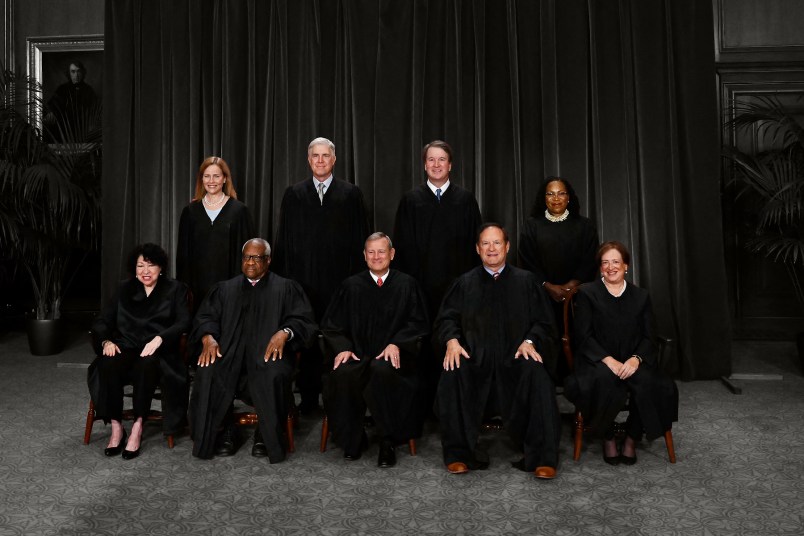The Supreme Court on Monday denied Louisiana’s attempt to block a lower court’s order that it redraw its congressional maps. That court found that the state had likely diluted the power of Black voters in violation of the Voting Rights Act.
“This will allow the matter to proceed before the Court of Appeals for the Fifth Circuit for review in the ordinary course and in advance of the 2024 congressional elections in Louisiana,” the brief Supreme Court order said.
Louisiana was trying to take a shortcut by going right to the Supreme Court — which the majority denied — though the Court had let the gerrymandered map stand for the 2022 midterms, despite the lower court finding.
The Court’s sending the case back down to the lower courts opens the door to Louisiana eventually having to redraw its map to include two districts — instead of one — where Black voters have the ability to elect the candidate of their choice. In the meantime, though, the case for adding this district may not fare well at the infamously right-wing 5th Circuit, setting up a new round of appeals that will likely see the case return to the Supreme Court in the future.
Experts pointed to Louisiana — along with Georgia and Texas — as the likeliest states to see their maps reconfigured with additional minority opportunity districts after the Court knocked down Alabama’s racially gerrymandered map in a surprising, pro-voting rights decision earlier this month. The Supreme Court had paused the Louisiana case until it came to a decision on the similar Alabama one.
That Alabama ruling had near-immediate ramifications, as the judge in a Georgia redistricting case directed the parties involved to submit supplemental briefings addressing the new Supreme Court decision.
The Alabama decision stunned the voting rights world, a contingent that has become very used to the Roberts Court’s long and storied hostility towards the VRA. In a series of major decisions starting in the 2010s, the Court zeroed out some of the most powerful provisions of the landmark civil rights law, opening the floodgates to gerrymanders and voter suppression laws, particularly in southern states.
But earlier this month, the three liberals, joined by Chief Justice John Roberts and Justice Brett Kavanaugh, preserved Section Two of the law, knocking down Alabama’s attempt to impose a novel test that would make it nearly impossible to prove racial vote dilution cases.
We’re already seeing that major decision ripple out, affecting both the enfranchisement of minority voters and the playing field for the House of Representatives in 2024, which Republicans currently hold by a very slim margin.
Read the order here:







Let it be. Let it be…
Roberts, et al damned well better atone in full for their gutting the VRA!
So the case will rattle around the federal judiciary for years to come through repeated remands and appeals while the state gets to keep its discriminatory map.
As they say, “justice delayed is justice denied.”
Other states that also might go the SCOTUS route - Wisconsin and Florida. Wisconsin got stuck with the “least change” criteria, which somehow morphed from “slightly less Republican, but still a majority” to “even more Republican.” And Florida Man ignored everyone and said “use mine!”. These days, at least a few rulings are going against him.
What part of this news don’t you understand?